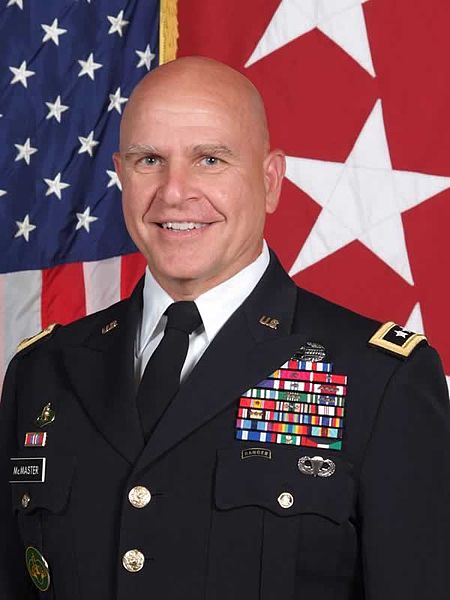Views expressed in opinion columns are the author’s own.
On Feb. 20, President Trump announced Lt. Gen. H.R. McMaster as his new national security adviser. An active-duty Army general, McMaster is perhaps the single best pick Trump has made to date.
The National Security Council, an apparatus designed to advise the president on national security and foreign policy matters, has traditionally been an apolitical assembly, which makes the latest shakeup of the council rather disturbing. Steve Bannon, Trump’s chief strategist, was recently elevated to serve on the NSC’s principals committee, the first ever political adviser to do so. Here is where the new national security adviser will become a corrective force. After all, McMaster quite literally wrote a book on the failings of a leadership preoccupied by politics.
After the first Gulf War, in which a young McMaster served at the Battle of 73 Easting, the budding general attended the University of North Carolina at Chapel Hill, earning a doctorate in history. His thesis would later become the basis of his book: Dereliction of Duty. In it, McMaster was highly critical of the Joint Chiefs of Staff under President Lyndon B. Johnson. He viewed them as having capitulated to the political pressure of the president and as having supported a war strategy they knew full well could never succeed.
In the book, McMaster explained that Johnson’s short-sighted focus on politics inhibited his administration from dealing with the nuances of the Vietnam War. Elaborating, McMaster notes “LBJ’s advisory system was structured to achieve consensus and to prevent leaks.” Both critiques are eerily reminiscent of the current administration’s tension regarding leaks to the press and focus on irrelevant minutia pertaining to political objectives, such as inauguration crowd sizes.
Among the leadership McMaster indicts throughout his book is Gen. William Westmoreland. Specifically, McMaster dials in on the failed “war of attrition” policy, which created military activity absent a clear objective. This is a criticism of strategy the general later took to heart during his time in Iraq.
In 2004, violence in Iraq rose and military leaders quickly identified the situation at hand as an insurgency. Counterinsurgency tactics have historically proved difficult for occupying forces to implement, so when someone does it right, their ideas should be replicated. McMaster did it right.
As the commander of the 3rd Armored Cavalry Regiment, the general implemented one of the first successful counterinsurgency initiatives in the Iraq War, at the city of Tal Afar. There, McMaster surgically targeted insurgent safe havens outside the city to deny the enemy rehabilitation points, built a 9-foot high dirt berm around the city to control the flow of the population and established a refuge where he encouraged civilians to take shelter before his troops assaulted the city. After four months of preparation, the third ACR methodically took the city back from insurgents, but more importantly, McMaster had a plan for what to do with the city afterward.
The follow-on plan was where many military planners had originally failed in the Iraq War. McMaster executed a post-combat operation that included recruiting a local police force composed primarily of Sunnis, rather than allow vengeful Shiite militias near-total control as other U.S. commanders in Iraq had done. Additionally, he ensured a working city council and mayor was in place by year’s end. The underlying theme of McMaster’s success was a measured, respectful consideration of past events and local trends.
McMaster was fully aware of the need for cooperation with locals. He established a culture of respect, promoting fair treatment of prisoners and quashing the use of slang words like “haji” in reference to Iraqis. He understood a key principle of counterinsurgency the military still grapples with today; if you want to win a war, win the hearts and minds of the indigenous population.
Addressing Sunni leaders, he once acknowledged that Americans had entered Iraq haphazardly and petitioned them to join in the leadership of the new country he was trying to help them build. McMaster’s public acceptance of past mistakes and his conciliatory approach to local populations will be a much-needed respite from the overly-aggressive Trump administration’s approach to foreign affairs.
Despite McMaster’s critique of military leadership and unconventional concessions to Iraqis regarding America’s failures, he continued to ascend in rank. Indeed, his book on the flaws of U.S. military leadership during the Vietnam era became a regular read among military officers. His tested ability to push reform while winning support with his contemporaries will be crucial as he juggles a politicized foreign policy team that lacks consistency in presentation.
The previous national security adviser, Michael Flynn, was known for his chaotic management style. And with political advisers like Bannon injecting themselves into the president’s foreign policy decisions, our allies and adversaries alike are failing to find a coherent message in American doctrine. Is America committed to the NATO alliance, or are we planning to extort our allies in Europe for not putting enough into NATO’s collective defense pot? Are American troops going to deploy against ISIS’ receding caliphate and siphon off Iraqi oil reserves as spoils of war, or are we going to stay the course and allow coalition forces to finish off Raqqa and Mosul as planned?
These inconsistent messages pushed by Trump surrogates, and Trump himself, sow confusion in the world order. The campaign is over. The most prudent choices may not be politically expedient and McMaster’s background points to an understanding of this. If he is allowed control over the NSC to the degree his position demands, the appropriate remedial action can be expected.
Kyle Rempfer is a sophomore government & politics and Russian major. He can be reached at krempfer@terpmail.umd.edu.
CORRECTION: A headline on this article referred to H.R. McMaster as a cabinet pick. He is not a part of President Trump’s cabinet. The headline has been updated.



